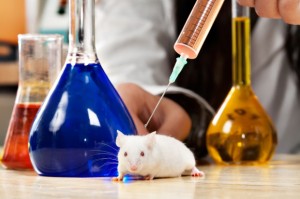Treatment for Aggressive Prostate Cancer
How an HIV Drug Could Stop the Spread of Aggressive Prostate Cancer
 Prostate cancer is often a slow-growing cancer that requires little treatment. Up to 90 percent of men with prostate cancer will eventually die of some other cause. However, 10 to 15 percent of patients develop a more aggressive form of the cancer — one that spreads quickly to the bones or brain and causes pain, disability, and rapid death. New research suggests, however, that a drug called maraviroc, which is used to treat HIV, may be able to significantly slow the progression of aggressive prostate cancer.
Prostate cancer is often a slow-growing cancer that requires little treatment. Up to 90 percent of men with prostate cancer will eventually die of some other cause. However, 10 to 15 percent of patients develop a more aggressive form of the cancer — one that spreads quickly to the bones or brain and causes pain, disability, and rapid death. New research suggests, however, that a drug called maraviroc, which is used to treat HIV, may be able to significantly slow the progression of aggressive prostate cancer.
Maraviroc Targets Protein Implicated in Prostate Cancer Spread
Researchers from Thomas Jefferson University believe that a protein known as CCR5 is responsible for helping prostate cancer cells spread. Earlier work by the same team of researchers found that CCR5 also drives the spread of aggressive breast cancer. The HIV drug, maraviroc, may slow the spread of prostate cancer by blocking CCR5 receptors on the surface of prostate cancer cells. The mechanism is similar to the way the drug works to treat HIV, since the HIV virus relies in the CCR5 receptors on white blood cells in order to invade and destroy those cells.
Drug Reduces Spread of Prostate Cancer in Mice
In order to test the efficacy of maraviroc in stopping the spread of prostate cancer cells, researchers tested the drug on mice suffering from metastatic prostate cancer. The researchers first genetically altered mouse prostate cells in order to encourage them to become aggressively cancerous. They then analyzed the cells in the lab to determine if they were behaving in a way similar to that of metastatic cancer cells.
 The researchers also compared genetic activity in normal prostate cells with that of the genetically-engineered cancer cells, to see if genetic differences between the two could be contributing to the spread of prostate cancer in the mice. They found that a gene involved in the CCR5 signaling pathway was responsible for the spread of aggressive prostate cancer in the mice, and investigated whether blocking the action of the associated protein — CCR5 — might also stop the spread of cancer. Researchers believe that the CCR5 signaling pathway and protein may also be responsible for the spread of prostate cancer in humans. Blocking the spread of aggressive prostate cancer can significantly improve survival rates and can greatly expand treatment options. Almost 100 percent of men who are treated before prostate cancer spreads are still alive five years later.
The researchers also compared genetic activity in normal prostate cells with that of the genetically-engineered cancer cells, to see if genetic differences between the two could be contributing to the spread of prostate cancer in the mice. They found that a gene involved in the CCR5 signaling pathway was responsible for the spread of aggressive prostate cancer in the mice, and investigated whether blocking the action of the associated protein — CCR5 — might also stop the spread of cancer. Researchers believe that the CCR5 signaling pathway and protein may also be responsible for the spread of prostate cancer in humans. Blocking the spread of aggressive prostate cancer can significantly improve survival rates and can greatly expand treatment options. Almost 100 percent of men who are treated before prostate cancer spreads are still alive five years later.
When the researchers administered maraviroc to the mice with prostate cancer, the results were astonishing. They found that the drug blocked the action of CCR5 protein and stopped the spread of prostate cancer by more than 60 percent. Further research is needed to determine if maraviroc has a similar effect on prostate cancer in humans, but since the drug is already approved for the treatment of HIV, human trials can begin much sooner than if this were a drug still in development.
Prostate cancer affects one in seven American men, but it is a survivable cancer as long as it is treated before it has a chance to spread. A drug already used to treat HIV may help stop the spread of aggressive prostate cancers. For the 10 to 15 percent of men whose prostate cancers are aggressive, this drug could mean a second chance at life.
